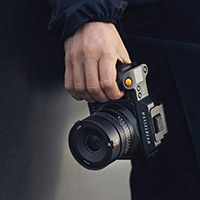Video: Is there such a thing as too much technology in your camera?
posted Thursday, November 3, 2022 at 2:30 PM EDT

Here at Imaging Resource, we're always interested in the latest and greatest camera technology. Recent innovations like AI-powered subject detect AF and super-fast stacked image sensors, for example, have made it easier than ever to capture incredible photos in traditionally very challenging situations. That's great news, right? Photographer James Popsys isn't so sure.
Popsys primarily uses a Sony A7R IV for his landscape photography, so he was keen to learn more about the new A7R V. Much of the A7R V's appeal comes down to its improved autofocus technology, which features deep learning to deliver fine-tuned subject-detect AF. It's all very cutting-edge. It's overkill for Popsys. Further, he's wondering if, at some point, technology will become so advanced that photography itself will feel "too easy" and lose part of its charm.
It's an interesting topic. As Popsys mentioned, Leica also released a new camera recently, the Leica M6. The M6 is a very different camera from the A7R V for many reasons, not the least of which is that the M6 is a re-release of a 20-year-old film camera. That's right, Leica is producing a "new" film camera in 2022.
The two cameras represent two vastly different approaches to cameras. Of course, Leica actively develops new digital cameras with sophisticated modern technology, but the M6 shows that photographers still desire something more basic and hands-on.
I'm fortunate to use many of the newest cameras here at Imaging Resource. It's exciting to take brand-new mirrorless cameras into the field and see how their incredible technology and features help make it easier to capture images. And yet, as fantastic as many new cameras are, I especially enjoy times when I use cameras that require me to slow down and be more methodical. For example, the Phase One XT includes X/Y axis dials for shifting the focal plane and requires full manual focus. Another camera I shot this year, the new Hasselblad X2D 100C, while packed to the gills with the latest in image sensor technology, doesn't include relatively fancy autofocus technology. (By the way, my X2D 100C Hands-on Review will be coming soon). I thoroughly enjoyed using those cameras, not despite the challenges associated with using them, but because of the challenges.

I paired the Phase One XT with the IQ4 150MP Achromatic digital back. The 150-megapixel medium-format image sensor is extremely advanced. However, it only captures black-and-white images and the camera is fully manual. It's slow and hard to use, but extremely fun and rewarding, too.
Can modern cameras with advanced technologies make capturing images so easy and hands-off that photography becomes less fun?
If I were spending my money on a new camera, which I don't do very often, I'd probably still opt for the latest model with the best technology. However, how useful that technology depends heavily on the individual user. And I must agree with Popsys. There comes a point when advanced camera technology can create a disconnect between the photographer and the image they capture. I'm extremely excited to see where camera makers take their technology in the years ahead, but sometimes, it's nice to get back to the basics.
(Via James Popsys)